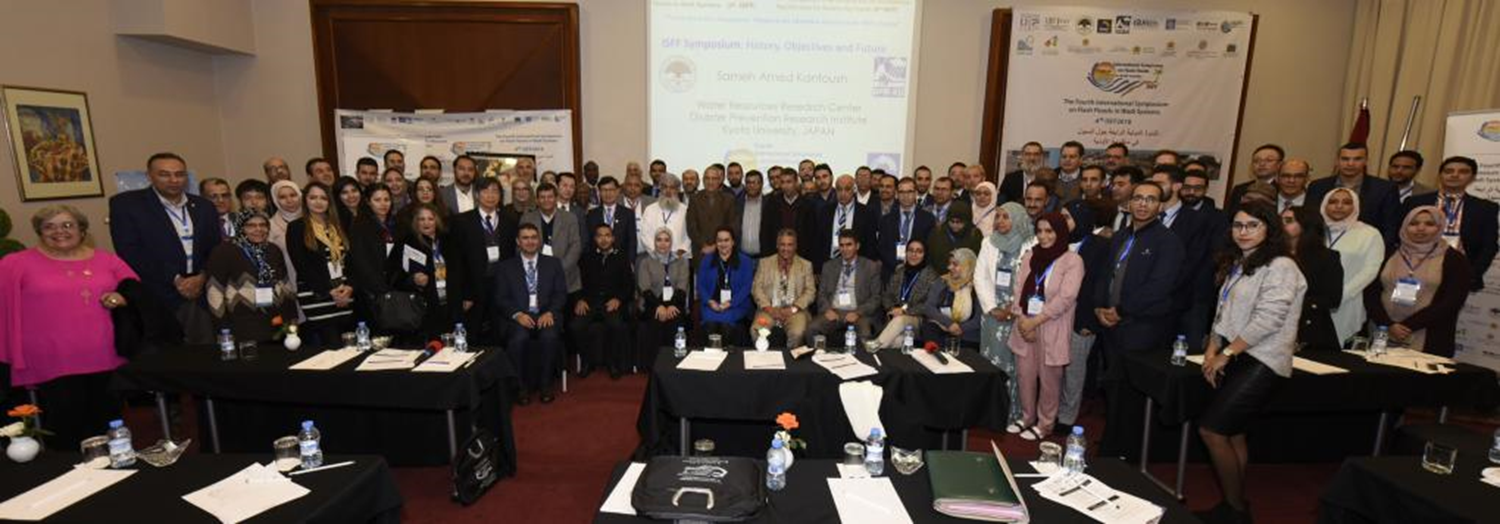The Fourth International Symposium on Flash Floods in Wadi Systems: Urban Flood Risk Management: Mitigation and Adaptation Measures in the MENA Region
Schedule:4 – 6 December 2018
Place:Casablanca, Morocco
URL:http://www.isff2018.com
The Fourth International Symposium on Flash Floods in Wadi Systems
Urban Flood Risk Management: Mitigation and Adaptation Measures in the MENA Region
4 – 6 December 2018, Casablanca, Morocco

In the last two decades, many Arab cities such as Riyadh (2016), Casablanca (2016), Doha (2015) and Guelmim (2014) have experienced flash floods despite their highly arid and semi-arid climate. These events have caused live losses and important damages. Such causalities are usually due to the combination of many factors such as extreme precipitations, weak or insufficient urban storm water infrastructure and drainage system, urban stream bursting their banks, uncontrolled urban sprawl, groundwater table high rise or tides generated backwater effects on drainage systems outlets in coastal cities. These phenomena are still not well studied. Besides, mitigation and adaptation measures are very rare in such countries and regions because of the prevailing arid or semi- arid climate and growing urbanization.
Tackling these problems requires a good analysis of climate change and meteorological data, particularly precipitation, and good knowledge of the city vulnerability to floods in such territories. Finding solutions to these challenging problems also requires close collaboration between scientists, practitioners and stakeholders from local, regional, national and international organizations whether they are public or private. So we encourage you to contribute to the development of future solutions for urban floods in the MENA countries.
This event is the fourth in a new series of annual international symposia on flash floods in wadi systems. Furthermore, this symposium is supported by the Water Resources Research Center (WRRC) and the Global Alliance of Disaster Research Institutes (GARDI) of the Disaster Prevention Research Institute (DPRI) at Kyoto University, Japan. The first International Symposium on Flash Floods in Wadi Systems held in October 2015 in Kyoto, Japan, was attended by about one hundred scientists, practitioners and stakeholders from 11 countries (Japan, Arab Region, Europe; see (http://ecohyd.dpri.kyotou.ac.jp/en/index/1.html). The second symposium was held at Technische Universitat Berlin, Campus El Gouna, Egypt (http://www.campus-elgouna.tu-berlin.de/home/international_symposium_on_flash_floods/). The third International Symposium on Flash Floods in Wadi Systems was held in Oman (http://isff2017.gutech.edu.om/) and the fourth edition of this international symposium will be held in Casablanca, Morocco.
Objectives of ISFF
- To define priorities for future research challenges, gaps, and potential projects for Flash Floods in Wadi Systems.
- To form a platform for networking-sharing experiences and data between the participated countries and authorities.
- To stimulate the cooperation among researchers in fundamental and applied sciences towards WFF research.
- To introduce Japanese technologies to help in FF protection and harvesting.
- To develop new creative ideas and projects to adapt and mitigate FF.
Symposium themes:
- River/Wadi basin management and flood protection
- Storm water infrastructures and urban drainage systems
- Urban planning, green infrastructure and flood mitigation
- Climate change impacts, weather forecasting and flood warning systems
- Rainfall-runoff data monitoring and analysis
- Hydrology and hydraulic modeling of floods
- Groundwater flooding and impacts on urban areas
- Sediment management, water harvesting and flood control
- Flood vulnerability and risk assessment
- Flood damage assessment: environmental, social and economical tools
- Flood adaptation: structural and non-structural measures
Committees
Organizing committee
- Prof. Dalila Loudyi,UH2C-FSTM, dalila.loudyi@univh2c.ma
- Prof. Sameh Kantoush, Kyoto-U, kantoush.samehahmed.2n@kyoto-u.ac.jp
- Dr. Ahmed Hadidi, GUTech, Ahmed.Hadidi@gutech.edu.om
- Prof. Mohamed Chagdali, UH2C-FSB, chagdalimohamed@gmail.com
- Prof. Meryem Tanarhte, UH2C-FSTM, meryem_t@yahoo.com
- Prof. Abdeslam Taleb, UH2C-FSTM, talebabdeslam1@gmail.com
- Dr. Mohamed Saber, Kyoto-U, mohamedmd.saber.3u@kyoto-u.ac.jp
- Dr. Mohammed Abdel-Fattah, Kyoto-U, soliman.mohammed.7x@kyoto-u.ac.jp
International scientific committee
- Prof. Ekkehard Holzbecher, German University of Technology, Oman
- Prof. Sameh Kantoush, WRRC, DPRI, Kyoto University, Japan
- Prof. Uwe Tröger, TU Berlin Campus El Gouna, Germany
- Prof. Reinhard Hinkelmann, TU Berlin, Germany
- Dr. Riadh Ata, EDF, France
- Prof. Tetsuya Sumi, WRRC, DPRI, Kyoto University, Japan
- Prof. Hirokazu Tatano, Secretary-General GADRI, Kyoto University, Japan
- Prof. Emad Habib, University of Louisiana at Lafayette, USA
- Prof. Mathias Kondolf, University of California Berkeley, USA
- Prof. Anton Schleiss, EPFL, Lausanne, Switzerland
- Prof. Ali Al-Maktoumi, Sultan Qaboos University, Oman
- Prof. Mohamed Elhag, King Abdulaziz University, Saudi Arabia
- Prof. Latifa Mouhir, Hassan II University of Casablanca, Morocco
- Prof. Mohamed Sinan, Hassania School of Public Works, Casablanca, Morocco
- Dr. Kamal El Kadi Abderrezzak, EDF, France
- Dr. Mohammed Amin Hafnaoui, CRSTRA, Algeria
- Dr. Taleb Odeh, The Hashemite University, Jordan
- Prof. Mohamed El- Manadely, King Abdulaziz University, Saudi Arabia
- Dr. Marian Muste, IIHR, University of IOWA, USA
- Prof. Aminuddin Ab Ghani, REDAC, Universiti Sains, Malaysia
- Dr. Alastair G. Barnett, Hydra Software, New Zealand